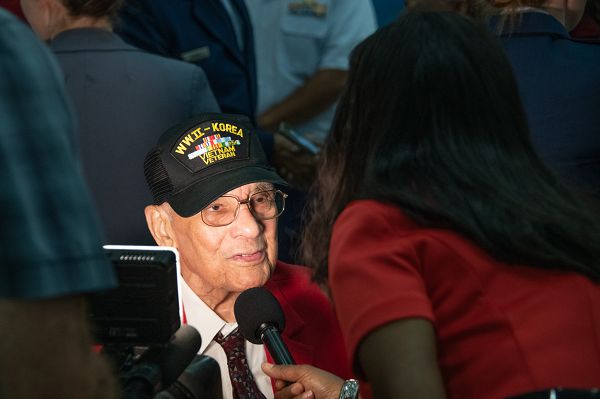
Tuskegee Airmen Honored 75 Years After Desegregation Of Military
Join Base Andrews, Maryland. (July 26, 2023): In this photo by Senior Airman Tyrone Thomas, Retired Colonel Carl C. Johnson, a Tuskegee Airman, is interviewed during a ceremony celebrating the 75th anniversary of the desegregation of America’s armed forces.
Colonel Johnson was born in Bellaire, Ohio in 1926.He attended Ohio State University until he was drafted into the U.S. Army Air Force in 1945. In October 1946, he and fourteen other African American draftees entered the Tuskegee Army Air Force aviation cadet program. He served as a member of the 477th Bombardment Group Composite’s 617th Bomber Squadron and was discharged in 1947.
Johnson later returned to active duty as a U.S. Army aviator during the Korean War.
During the Vietnam War, Johnson commanded a seven-company aviation battalion and later Commanded a US Army Aviation Battalion in the Republic of South Korea. Johnson retired from the US Air Force with the rank of Colonel after 31 years in the U.S. military.
The Tuskegee Airmen were a group of African American military pilots (fighter and bomber) and airmen who fought in World War II. The name also applies to the navigators, bombardiers, mechanics, instructors, crew chiefs, nurses, cooks, and other support personnel. The Tuskegee pilots received praise for their excellent combat record earned while protecting white American bombers from enemy fighters. The group was awarded three Distinguished Unit Citations.
When the Tuskegee aviators painted the tails of their P-47s Mustang planes red, the nickname "Red Tails" was coined as the nickname for the first African American military aviators in the United States Armed Forces. During World War II, black Americans in many U.S. states were still subject to Jim Crow laws and the American military was racially segregated, as was much of the federal government. The Tuskegee Airmen were subjected to discrimination, both within and outside of the army, during their service.
Seventy-five years ago this week, President Harry Truman issued Executive Order 9981 stating that "there shall be equality of treatment and opportunity for all persons in the armed forces without regard to race, color, religion, or national origin." It established the President's Committee on Equality of Treatment and Opportunity in the Armed Services which recommends revisions to military regulations to implement this policy.
There was considerable resistance to the executive order from the military, but by the end of the Korean conflict, almost all the military branches were integrated.


